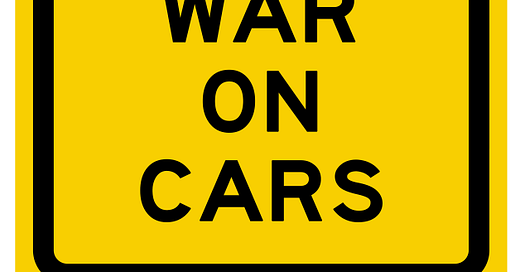On Improving Neighborhoods Somewhat
As 311 shows us, indifference to lower-income communities is the color of many city governments' energies
Someone (it doesn’t matter who) got dogpiled on Twitter last week for making an intentionally provocative claim about bike lanes. That person has long since deleted the claim—not, I’m sure, because any of the myriad pro-bike lane responses were persuasive, but because it’s unpleasant to be dogpiled on Twitter, which is not really a place for persuasion. (It is a place for making intentionally provocative claims, and joining dogpiles.)
The claim was basically that bike lanes are a tool of gentrification. I can put myself in the mindset that sees “bike lanes” as symptoms of something called “gentrification,” but the reason for that is precisely why the initial claim is so silly: “Bike lanes” represent a city trying to improve a neighborhood, and in the U.S. that happens after an area becomes high-income, not before. A simple look at the New York City bike network map, with an extensive network of protected lanes in Manhattan, a decently sized network of (mostly useless) unprotected lanes in Williamsburg and Brownstone Brooklyn, and vast stretches of nothing in the rest of the outer boroughs, suggests bike lanes are less a vanguard of gentrification than a lagging indicator, with a lag time, in some cases, of several decades.
Here is a very banal observation about U.S. governments, and in particular urban governments: They are responsive to the desires of wealthy residents and mostly indifferent to the needs of poor ones. The distinction between “needs” and “wants” is actually sort of important. Many people who work in city agencies, attend meetings, or talk to elected officials will tell you that low-income neighborhoods don’t ask for the sorts of improvements to street life that wealthy neighborhoods do. This does not necessarily mean they wouldn’t welcome them. The main reason they don’t ask for them is that they have very low expectations of city governments.
I wrote last month for The Atlantic about the history of 311 (the phone number, not the band, to the disappointment of many). The gist of the piece is that 311, the number you call to tell the government something is wrong so that they come out and fix it, now increasingly reveals the limits of state capacity. It shows us what problems our cities are willing to ignore or unable to address, and it highlights the indifference of urban police departments to public safety and civilian oversight. While researching the piece, I read a study from NYU’s Marron Institute of Urban Management analyzing 311 reports in Kansas City. As their abstract put it: “Despite greater objective and subjective need, low-income and minority neighborhoods are less likely to report street condition or ‘nuisance’ issues, while prioritizing more serious problems.”
Higher-income neighborhoods, they found, both reported high satisfaction with street conditions and contacted 311 about them the most. A recent Houston Chronicle story lent support to the paper’s conclusion. Houston’s “affluent enclave” Greater Heights neighborhood generated the most 311 complaints in 2021—for the ninth consecutive year. People in rich neighborhoods expect high quality services, demand them, and, more often than not, receive them. Researcher Daniel T. O’Brien, who wrote a book about Boston’s 311, explained to the Chronicle why that is: “It could be that they trust the system more. There are disadvantaged communities that may not believe government is going to come and fix things.” People in lower-income areas expect the government to only do the bare minimum, if even that. The NYU authors refer to “sample bias in self reported data resulting from differential reporting behavior.” You might call it realism born of experience.
One perverse consequence of that realism is the emergence of bad actors who twist it into forms of the argument I described at the top, painting tentative and usually inadequate investments into amenities for low-income neighborhoods as unwanted by “the community.” Every neighborhood, every community, every block deserves to be as catered-to as the most entitled 311 callers in the country. Nice things do not cause gentrification, and you should not have to wait for gentrification to demand nice things.
On that note, I was very happy to talk with Doug, Sarah, and Aaron from The War on Cars recently about 311, Tesla, and illegal curb cuts. The episode went up today. Give it a listen here or wherever you get your podcasts.



